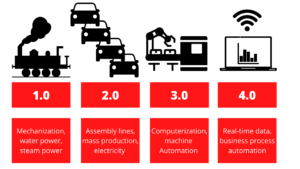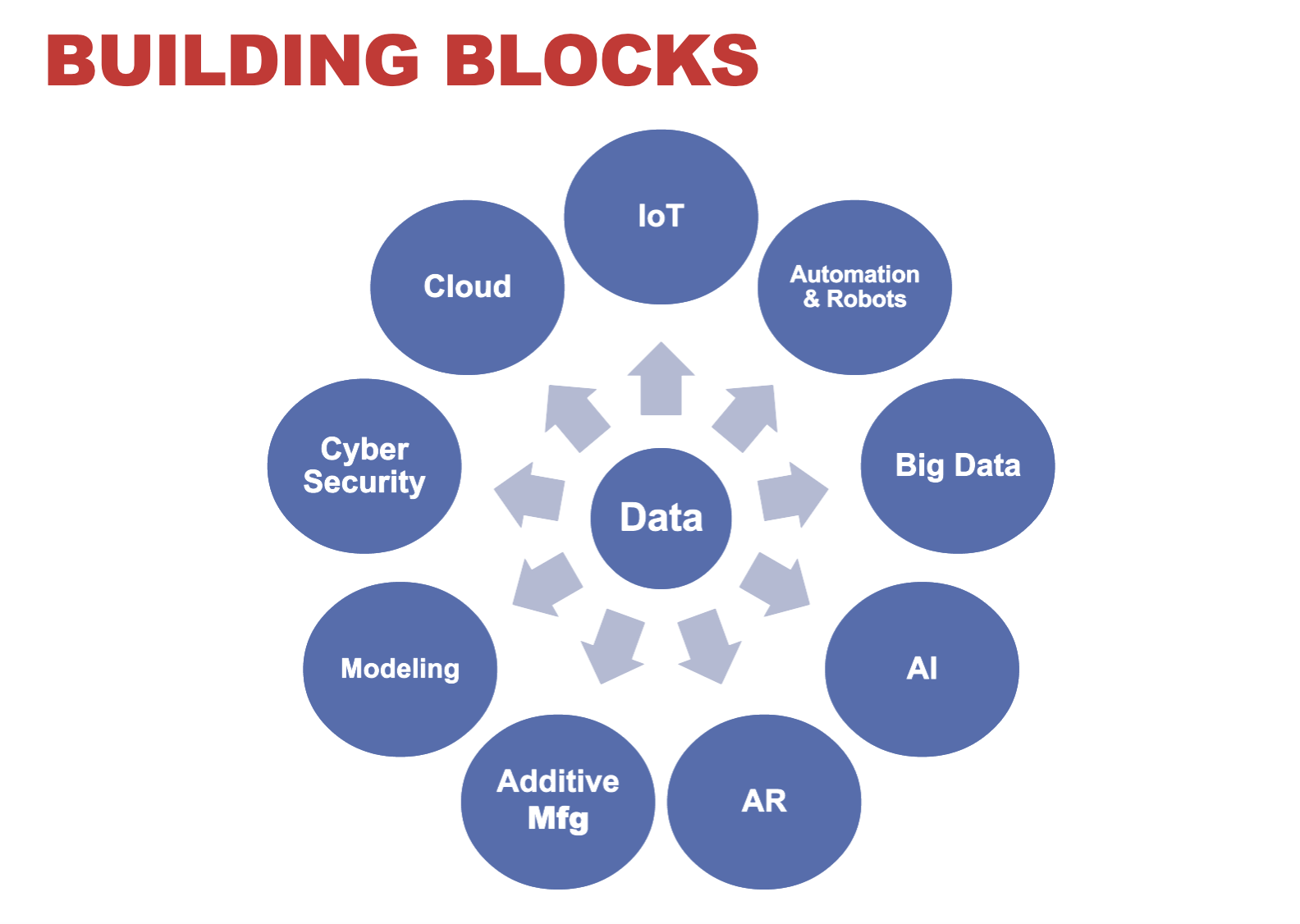Industry 4.0 in the Simplest Terms Possible
The manufacturing industry has been progressing towards the 4th industrial revolution. Industry 1.0 brought mechanized production with steam engines. Industry 2.0 brought mass production with assembly lines and electricity. Industry 3.0 brought automation, production without direct human intervention. What does Industry 4.0 bring? There is no revolutionary new style of machines, no upgrade from the use of electricity, and we already have machine automation in industry 3.0.
The simplest definition of Industry 4.0: Industry 4.0 is extracting and leveraging data pulled from existing equipment to automate business processes.
That’s it, I promised you the simplest definition possible. When you break Industry 4.0 down, data and what you can do with the data is what you are left with. There is no new style of manufacturing, an industry 4.0 factory physically looks very similar to an Industry 3.0 factory. The key difference causing it to become a revolution is the addition of deep real-time data that has never been available before. This data can be used to enable valuable, real-time decision-making- and that is what changes everything.
Industry 3.0 Automates Equipment, Industry 4.0 Automates Business Processes
It’s a common misconception that Industry 4.0 is all about automation and computerization. But, we already have automation and computerized machines, which is industry 3.0, nothing new. Though, of course, that’s not to say manufacturers aren’t continuing to add more automation to the plant floor. Manufacturing equipment has had automation ability for decades. These automated machines were a big deal and still are for the manufacturing industry. However, machine automation is not the point of emphasis in industry 4.0, not at all.
Industry 4.0 is the automation of business processes with the help of accurate real-time data. Real-time data that is trapped inside of these Industry 3.0 machines. Industry 4.0 provides manufacturers with the ability to unlock these machines, unleashing their true potential. With this data, you can track metrics and processes that you couldn’t before; gain detailed insight into every part of your business from the plant floor to the sales team, and everything and everyone can have access to deep real-time data to base decisions on and make improvements. It bridges the gap between the back office and the plant floor.
The 1 Thing that every Industry 4.0 tool revolves around
Data.
Industry 3.0 was missing the data, the substance to make informed business decisions. This causes manufacturers to leave a lot on the table. They don’t have real-time visibility into what’s going on on the factory floor. They don’t know where to focus when trying to improve inefficiencies, why machines are going down, why they have so much scrap, why they struggle with on-time delivery. Many decisions made today are subjective.
If they do have some data, some visibility, it is often basic, manually recorded data. The problem here is that, again, the data is basic, is less accurate, and likely outdated by the time it gets delivered and used. That is if it ever gets delivered in the first place.
This is the business challenge that can be solved, and the solution revolves around accurate real-time data.
A number of definitions of Industry 4.0 focus on 9 technologies to advance manufacturing. There are indeed many tools equipped with industry 4.0 capabilities that you can use to help you achieve your specific business goals. Illustrated in the graphic are the numerous data sources and tools. Data sources such as the cloud, and big data are of course, reliant on data. However, the tools such as IoT (Internet of Things) and AR (Augmented Reality), are also completely based on the power of data. It is true that IoT helps connect machines, devices, equipment, and people together, but the connected network is just one aspect of Industry 4.0. The real power comes from the contextualized and accurate data that is created by this network of people and equipment. The omnipresence of data and the value companies can derive from it causes the slightly different definition of Industry 4.0.
The True Power of Real-Time Data
The addition of real-time data changes everything. Industry 4.0 brought the ability to collect real-time data from everywhere, process it, learn from it, and make processes better in real-time. This unlocks numerous possibilities on the plant floor and throughout the entire company. Here are a few areas within manufacturing companies that can be substantially improved with the help of Industry 4.0 data-
- Reduced machine downtime and improved machine availability
- Reduced scrap and waste
- Improved lead times
- Smarter more informed employees enabled by data
- Accountability
- Improved productivity
- Increase production output
- Increase revenue and profits
- Do More With What You Already Have
Industry 4.0 data is a major key to improvement in manufacturing today, the answer is not buying more machines to make up for the lack of production from current equipment.
Reducing machine downtime, scrap, and waste can all be improved by picking up on tendencies you see in the data, and machine learning. You will start to see why a machine is going down, symptoms and causes. You can see where scrap is coming from, and use this information to make adjustments and improve plant floor efficiency. Quicker, more efficient production means more parts produced in less time, and this leads to better on-time delivery, output, and revenue. Employees will start to see what’s happening inside the machines in real-time, enabling them to make data-driven decisions to improve their process and instantly see the results.
The Future of Manufacturing
It’s clear that Industry 4.0 is the future of manufacturing. Companies like Amazon, Tesla, and Facebook have been extremely data-centric, and these companies are leading the digital transformation charge. Companies such as these are leveraging data and applying industry 4.0 principles to make data-driven decisions. They are constantly growing, constantly innovating, constantly analyzing, and improving their current processes to drive better business. It has become apparent that these are the types of companies that will thrive today and in the future. Following in their footsteps and applying the same principles can put you on the right path to set yourself apart from the competition, give yourself the edge, and “future-proof” your business.








